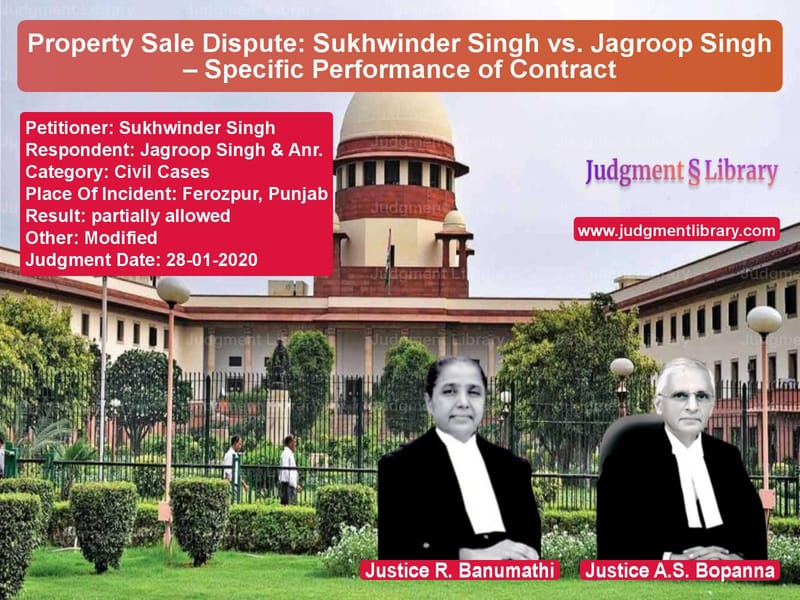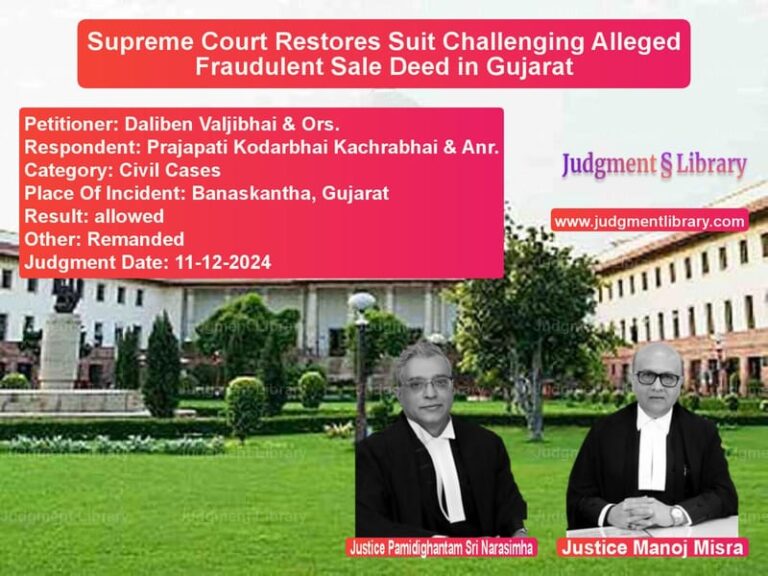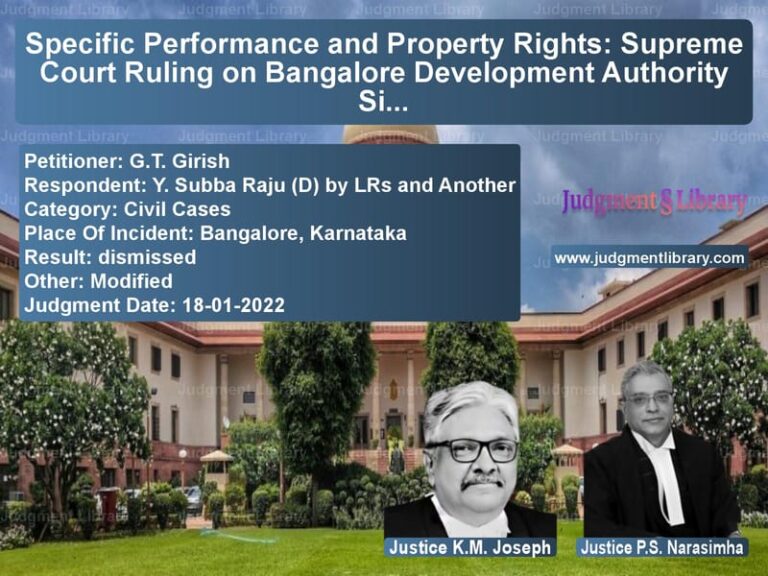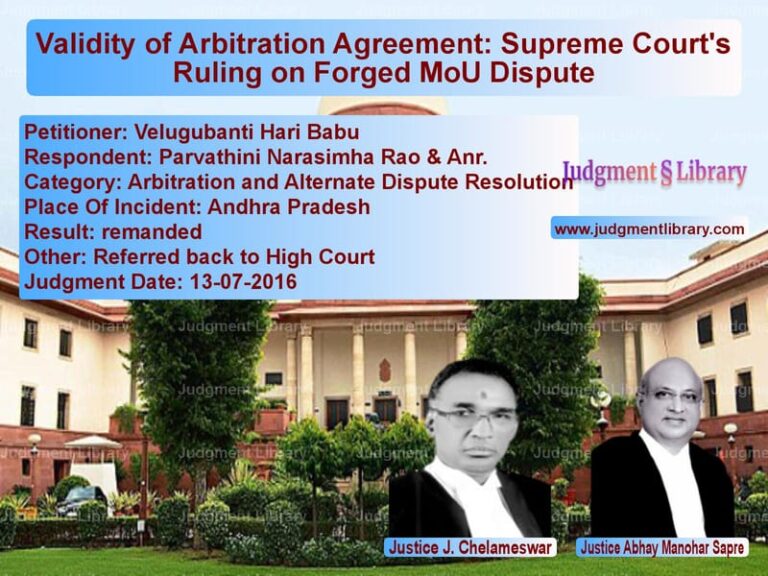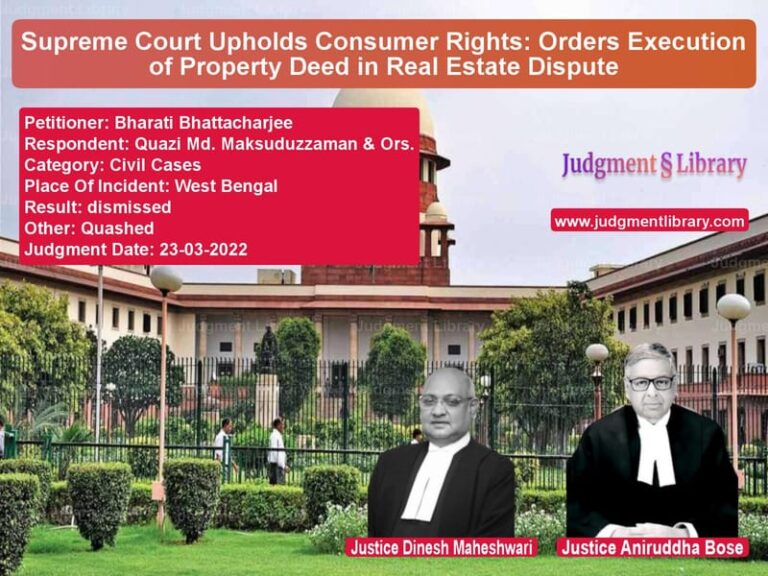Property Sale Dispute: Sukhwinder Singh vs. Jagroop Singh – Specific Performance of Contract
The case of Sukhwinder Singh vs. Jagroop Singh & Anr. is a significant civil dispute concerning the enforcement of a specific performance contract in real estate. The Supreme Court was tasked with determining whether a subsequent purchaser could be forced to transfer the property to the original buyer based on an earlier agreement.
Background of the Case
The respondent, Jagroop Singh, had entered into an agreement to purchase a property measuring 3 Kanals 4 Marlas in village Dulla Singh Wala, Ferozpur, for a sum of Rs.1,40,000. An earnest money deposit of Rs.69,500 was paid on January 3, 2004, with the balance to be paid by June 15, 2004, when the sale deed was to be executed.
However, before the sale deed could be executed in favor of the respondent, the original owner sold the property to the appellant, Sukhwinder Singh, on June 11, 2004. Learning of this, the respondent filed a suit for specific performance, seeking to enforce the original sale agreement and get the property transferred to his name. Alternatively, he sought the refund of his earnest money along with damages of Rs.1,40,000.
Legal Proceedings
The trial court ruled in favor of the respondent, decreeing specific performance of the contract and ordering the transfer of the property. The first appellate court upheld this decision, following which the appellant approached the Supreme Court.
Arguments of the Appellant (Sukhwinder Singh)
The appellant made the following key arguments:
- He was a bona fide purchaser without notice of the prior agreement between the original owner and the respondent.
- He had lawfully registered the sale deed and had been in possession of the property since 2004.
- After nearly 16 years, evicting him would cause extreme hardship, as he had made substantial improvements to the property.
- The alternative relief of refunding the earnest money and damages should suffice instead of transferring the property.
Arguments of the Respondent (Jagroop Singh)
The respondent countered with the following arguments:
- He had paid a substantial sum as earnest money and was always ready and willing to pay the remaining amount.
- The sale executed in favor of the appellant was fraudulent and meant to defeat his legal rights.
- The trial and appellate courts correctly decreed the suit in his favor, and he was entitled to enforcement of the original agreement.
Key Observations of the Supreme Court
The Supreme Court considered the following key issues:
- Whether the appellant was a bona fide purchaser without knowledge of the prior agreement.
- Whether the respondent had demonstrated his readiness and willingness to complete the sale.
- Whether the alternative relief of refunding the earnest money would be sufficient.
The Court made the following findings:
- The sale in favor of the appellant took place before the final date of execution of the original agreement.
- The respondent had deposited the balance consideration in court, proving his readiness and willingness.
- However, after 16 years, removing the appellant would cause significant hardship.
- Instead of enforcing specific performance, the Court decided to modify the relief by awarding enhanced damages.
Verbatim Court Findings
The Supreme Court, while modifying the judgment, stated:
“Specific performance is a discretionary relief. Considering the passage of time and the improvements made by the subsequent purchaser, granting damages instead of specific performance would serve the ends of justice.”
Additionally, the Court observed:
“The alternative relief of refunding Rs.69,500 as earnest money along with additional compensation of Rs.3,50,000 is deemed just and fair in the present circumstances.”
Legal Precedents and Judicial Reasoning
The Court relied on previous judgments concerning specific performance, including:
- Surinder Kaur vs. Bahadur Singh – Emphasized that specific performance is a discretionary remedy.
- Manjunath Anandappa vs. Tammanasa – Held that hardship caused to the defendant is a relevant consideration in specific performance cases.
Impact of the Judgment
The ruling reinforces the principle that specific performance is not an absolute right and that courts can consider alternative relief in cases of hardship. It also clarifies that bona fide purchasers with valid title should not be unfairly displaced after a long period.
Final Judgment
The Supreme Court ruled in favor of the appellant by modifying the relief:
- The decree for specific performance was set aside.
- The appellant was directed to pay Rs.3,50,000 to the plaintiff within three months.
- Failure to pay within the stipulated time would result in interest of 12% per annum.
- The plaintiff was allowed to withdraw Rs.70,500 already deposited in court.
Final Verdict: Appeal partially allowed, relief modified to compensation instead of specific performance.
Petitioner Name: Sukhwinder Singh.Respondent Name: Jagroop Singh & Anr..Judgment By: Justice R. Banumathi, Justice A.S. Bopanna.Place Of Incident: Ferozpur, Punjab.Judgment Date: 28-01-2020.
Don’t miss out on the full details! Download the complete judgment in PDF format below and gain valuable insights instantly!
Download Judgment: Sukhwinder Singh vs Jagroop Singh & Anr. Supreme Court of India Judgment Dated 28-01-2020.pdf
Direct Downlaod Judgment: Direct downlaod this Judgment
See all petitions in Contract Disputes
See all petitions in Property Disputes
See all petitions in Damages and Compensation
See all petitions in Judgment by R. Banumathi
See all petitions in Judgment by A. S. Bopanna
See all petitions in partially allowed
See all petitions in Modified
See all petitions in supreme court of India judgments January 2020
See all petitions in 2020 judgments
See all posts in Civil Cases Category
See all allowed petitions in Civil Cases Category
See all Dismissed petitions in Civil Cases Category
See all partially allowed petitions in Civil Cases Category

